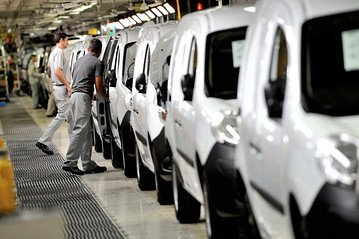Are Cars ‘Going Out of Style’ in Europe?

It’s a phenomenon dubbed as “peak-car” by analysts at Morgan Stanley.
As well as a declining population in many of Europe’s richer countries, car markets are close to saturation because of the relatively young age of Europe’s passenger-car fleet, a long-running tendency for European drivers to spend less time in their cars, and the increasing durability of modern cars which is squeezing demand for new vehicles. Add Europe’s economic malaise, where rising unemployment and increased taxes have hit demand for consumer goods in the region, and EU car demand may be on the same course as in Japan, where car demand has fallen since 1992.
Some industry executives and analysts fear the EU car market may never regain the nearly 16 million vehicles registered in 2007. Instead the market is more likely to shrink toward the previous low of around 11 million cars in 1993 before it stabilizes at only modestly higher levels, amid the rush by households and governments to reduce their debts.
Stuart Pearson, an analyst at Morgan Stanley, said a wide range of forces–from high fuel costs, increased online shopping and social interaction, to more congested roads in increasingly crowded European cities—are combining to make Europeans drive less than they used to.
“Our bottom-up analysis of ownership, demographic and vehicle-age trends suggests that a recovery in Europe could remain elusive for the rest of this decade,” Mr. Pearson said in a recent research note.
People in the industry agree.
“Europe resembles Japan in the early 90s,” said Hakan Samuelsson, the chief executive of Volvo Cars.
The one thing that might help investors and the European economy in the long runwould be to radically reduce supply in line with demand in Europe, beyond the significant but still piecemeal reductions currently underway at the likes of PSA Peugeot Citroen General Motors Co.’s Opel unit, and Ford Motor Co.’s European operations. These companies intend to stop vehicle production at a total of four factories by 2017.
But analysts reckon the EU has 15 to 20 factories operating at less than half of their capacity.
Indeed, the European Automobile Manufacturers’ Association Wednesday warned that demand for new cars in the European Union might shrink by around 5% in 2013 after falling 8.2% last year, as Europe’s economic malaise continues to sap demand.
“This is the second-largest annual decline since 1993,” said Ivan Hodac, secretary general of ACEA, as the auto maker’s association is known. Mr. Hodac estimated the market might contract “plus or minus 5%” this year.
Related News


